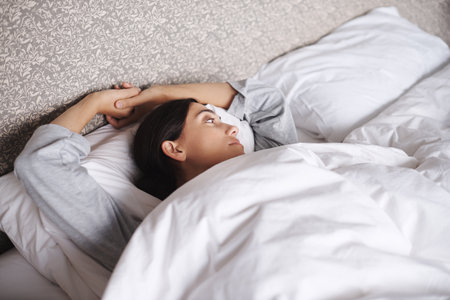The Prevalence of Insomnia in the UK
Insomnia is a growing concern for many people living in the United Kingdom, affecting both physical health and overall wellbeing. Recent studies reveal that as many as one in three adults in the UK experience symptoms of insomnia at some point, making it one of the most common sleep disorders in British society. This high prevalence can be attributed to a variety of unique factors present in daily British life. For instance, fluctuating work schedules, increased screen time, and the pressures associated with modern urban living all play a role in disrupting natural sleep patterns. Additionally, seasonal changes—such as longer nights during winter and lighter evenings in summer—can impact circadian rhythms, making it challenging for some individuals to maintain consistent sleep routines. The widespread use of caffeine, especially through tea and coffee culture, may also contribute to difficulties falling or staying asleep. Understanding these distinctive elements helps shed light on why insomnia remains a significant issue across the UK.
Common Causes of Insomnia
Insomnia is a widespread concern across the UK, affecting people from all walks of life. While anyone can experience sleeplessness from time to time, understanding the most common triggers is essential for finding effective solutions. In Britain, several unique factors contribute to disrupted sleep patterns. This section explores how lifestyle habits, societal pressures, and environmental influences—often shaped by UK-specific contexts—can play a significant role in insomnia.
Lifestyle Factors
The pace of modern British life is fast, often leaving little room for rest and relaxation. Many people work long hours or bring work home, blurring the lines between professional and personal life. High caffeine consumption, irregular meal times, and limited physical activity also contribute to sleep disturbances. Additionally, the popularity of evening social activities or screen time can delay the bodys natural wind-down process.
Societal Pressures
In the UK, societal expectations around productivity and achievement are high. Many individuals feel pressure to perform well at work or school, which can lead to persistent stress and anxiety. Financial concerns, particularly with rising living costs in major cities like London and Manchester, further add to mental strain. These pressures can keep the mind active at night, making it difficult to relax into restorative sleep.
Environmental Considerations
British environments present unique challenges for healthy sleep. Light pollution is a growing issue in urban centres, with streetlights and illuminated advertisements disrupting natural circadian rhythms. Unpredictable weather—ranging from extended periods of rain to sudden heatwaves—can also affect comfort levels in the bedroom. Poor insulation in older homes may lead to fluctuating temperatures that make it harder to maintain an optimal sleep environment.
Key Triggers of Insomnia in the UK
| Trigger | Description | UK Context |
|---|---|---|
| Work-related Stress | Pressure from long working hours or job insecurity | Common in competitive urban areas |
| Light Pollution | Artificial lighting interfering with sleep hormones | Prevalent in cities like London and Birmingham |
| Unpredictable Weather | Changes in temperature or humidity disrupting comfort | Frequent throughout the year across the country |
| Lifestyle Choices | Poor diet, lack of exercise, excessive screen time | Influenced by busy schedules and cultural habits |
| Societal Pressures | Anxiety about finances, achievements, or relationships | Affects all age groups nationwide |
By recognising these common causes of insomnia within the UK context, it becomes easier to make targeted changes to daily routines and environments that encourage more restful nights and improved overall wellbeing.

3. Symptoms and Impact on Daily Life
Insomnia can manifest in several ways, with symptoms often varying from person to person. The most common signs include difficulty falling asleep, waking up frequently during the night, or rising much earlier than intended and being unable to return to sleep. Many people in the UK also report feeling unrested even after a full night’s sleep, which can lead to daytime fatigue, irritability, and trouble concentrating.
The impact of insomnia goes beyond just feeling tired. Poor sleep can affect everyday activities such as work performance, driving, and even simple household tasks. Over time, this persistent lack of rest may strain relationships with family and friends, as mood changes and forgetfulness become more noticeable. For those living in the UK, where busy lifestyles and long commutes are common, these effects can be especially challenging.
Moreover, chronic insomnia can take a toll on overall wellbeing. It is linked with higher levels of stress and anxiety, making it harder to manage daily pressures. People may find themselves withdrawing from social events or hobbies they once enjoyed due to low energy. Recognising these symptoms early and understanding their impact is key to finding effective solutions for a better quality of life.
4. Diet, Lifestyle, and Natural Approaches
When it comes to addressing insomnia in the UK, gentle changes to diet and lifestyle can make a significant difference. The British diet, with its love for a strong cuppa, hearty meals, and occasional sweet treats, plays an important role in sleep quality. Understanding how certain foods and drinks affect our rest is the first step towards improvement.
How British Dietary Habits Influence Sleep
Caffeine is a staple in many British homes, whether from black tea or coffee. However, consuming these beverages late in the day can disrupt natural sleep rhythms. Likewise, heavy evening meals—think classic pies or roast dinners—may leave the digestive system working overtime during the night. On the other hand, lighter suppers rich in fibre and protein can promote restful sleep. Here’s a quick comparison:
| Dietary Choice | Impact on Sleep |
|---|---|
| Late-night tea/coffee | Can delay sleep onset due to caffeine |
| Sugary desserts before bed | Might cause night-time awakenings |
| Herbal teas (e.g., chamomile) | Promotes relaxation and ease into sleep |
| Light evening meal (e.g., porridge, yoghurt) | Easier digestion and better sleep quality |
Nutritional Support for Better Rest
Nutrients such as magnesium (found in leafy greens and seeds) and tryptophan (present in oats and dairy) can naturally support the body’s ability to relax. Incorporating these into daily meals may provide subtle but valuable benefits for those struggling with restless nights.
The Power of Evening Rituals
Cultivating a calming pre-bed routine is another key aspect of tackling insomnia. Many Britons find comfort in winding down with a mug of warm herbal tea—like valerian root or lavender—or a soothing bath infused with essential oils. Gentle stretching or a short walk after dinner can also help reduce stress levels and prepare the body for rest.
Exercise: Finding Balance
Regular movement supports overall health and sleep regulation. Activities such as walking in local parks, cycling, or even light yoga at home are accessible ways to expend energy without overstimulation. Just remember to avoid vigorous workouts close to bedtime, as they may increase alertness when you want to unwind.
In summary, small yet thoughtful adjustments—mindful eating, relaxing rituals, and regular gentle exercise—can collectively create an environment where restful nights become more attainable. By honouring natural rhythms and choosing supportive habits rooted in everyday British life, it’s possible to gently ease the symptoms of insomnia.
5. When to Seek Professional Support
While many people in the UK manage mild sleep disturbances with home remedies and lifestyle adjustments, there are times when professional help becomes essential. It’s important to recognise the signs that your insomnia may require more specialised care. If you find that lack of sleep is affecting your mood, concentration, or daily activities for several weeks, or if you experience persistent anxiety around bedtime, it might be time to seek support beyond self-care measures.
The NHS provides a range of resources tailored to those struggling with sleep issues. You can start by speaking with your GP, who can help identify underlying causes such as stress, mental health conditions, or physical health concerns. They may recommend cognitive behavioural therapy for insomnia (CBT-I), a proven approach often available through local NHS services. In some cases, referral to a specialist sleep clinic might be suggested for further assessment and treatment.
If you’re unsure where to begin, the NHS website offers practical guidance and self-assessment tools to help you decide if professional input is needed. Remember, seeking support is a sign of self-care rather than weakness. With the right help, restful nights can become part of your routine once again.
6. Conclusion: Nurturing Your Sleep Naturally
Understanding insomnia in the UK is the first step towards reclaiming restful nights and brighter days. While sleep difficulties can feel overwhelming, it’s important to remember that you are not alone—many across Britain experience similar challenges, especially given our modern lifestyles and unique cultural stressors. By gently prioritising natural sleep strategies, such as maintaining a consistent bedtime routine, enjoying calming herbal teas, and embracing mindful practices like evening walks or meditation, you can begin to nurture your body’s natural rhythm. Small changes, made with kindness and patience, can have a powerful impact on your wellbeing over time. Trust in your body’s ability to restore itself when given the right support. As you continue your journey towards better sleep, be gentle with yourself and celebrate every positive step. With a warm cup of chamomile in hand and a heart open to change, you’re well on your way to more peaceful nights and healthier tomorrows.

